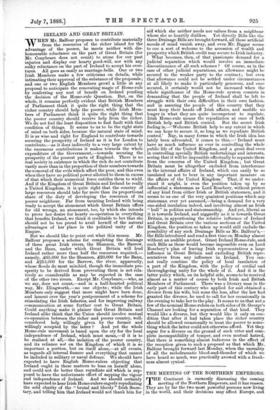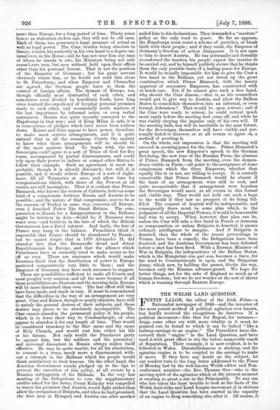THE MEETING OF THE NORTHERN EMPERORS: rpHE Continent is earnestly
discussing the coming JL meeting of the Northern Emperors, and it has reason. They are by far the two most powerful persons now living in the world, and their decisions may affect Europe, and more than Europe, for a long period of time. Thirty years hence, as statesmen reckon age, they will not be old men. Each of them, too, possesses a large measure of actual as well as legal power. The Czar, besides being absolute in theory, retains his authority in his own hand to a degree un- usual even in his House, and he has not near him any man of whom he stands in awe, his Ministers being not only second-rate men, but men without hold upon their offices other than his personal favour. That is not the position of the Emperor of Germany ; but his great servant obviously trusts him, or he would not send him alone to St. Petersburg ; and when Emperor and Chancellor are agreed, the German people leave to them the control of foreign affairs. The dynasts of Europe, too, though officially most distrustful of each other, and sometimes even divided, by hereditary feuds, have long since learned the expediency of keeping personal promises made to each other, and occasionally settle matters of the last importance by informal notes, or even verbal assurances. Bosnia was quite recently conveyed to the Hapsburgs in that way ; and if King Milan is safe, it is in consequence of pledges which have never been written down. Kaiser and Czar appear to have power, therefore, to make most serious arrangements, and it is quite natural that in all the remaining Courts the anxiety to know what those arrangements will be should be of the most anxious kind. To begin with, the two Sovereigns could. agree to a sort of Truce of God for five years, accompanied by partial disarmaments, and could rely upon their power to induce or compel other States to follow their example. Such an agreement is most im- probable, though it is already discussed ; but still, it is possible, and it would. relieve Europe of a sort of night- mare, fill all Treasuries at once, and allow time for reorganisations which, with three of the Powers at all events, are still incomplete. Then it is evident that Prince Bismarck, who knows the secrets of Cabinets, believes some kind of a compromise between Russia and Austria to be possible ; and the nature of that compromise, sure to be at the expense of Turkey in some way, concerns all Europe, even a detached Power like Great Britain. The com- pensation to Russia for a disappointment in the Balkans might be territory in Asia—would be, if Russians were wiser men—and territory in the fate of which the British Government has a direct interest. And lastly, the fate of France may hang in the balance. Frenchmen think it impossible that France should be abandoned by Russia ; but we cannot forget that in 1870 Alexander H. did abandon her, that the Romanoffs dread and detest Republicanism in Europe, and that the alliance which Frenchmen have so earnestly tried to make seems as far off as ever. There are successes which would make Russians think that the distribution of power in Europe mattered comparatively very little to them ; and the Emperor of Germany may have such successes to suggest. These are possibilities sufficient to make all Courts and most peoples very anxious, and all the more because if all these possibilities are illusions and the meeting fails, Europe will be more disturbed than ever. The last effort will then have been made, and made in vain. It must be remembered that the difficulties in the way of an arrangement are very great. Czar and Kaiser, though so nearly absolute, have still to satisfy the general desires of their subjects, and those desires may prove to be absolutely incompatible. The Czar cannot abandon the permanent policy of his people, which is to force their way to Constantinople, or even appear to abandon it for any length of time. That would be considered treachery to the Slav cause and the cause of Holy Church, and would cost him either his life or his throne. Not only would the Panslavist party be against him, but the soldiers and the peasantry ; and universal discontent in Russia always makes itself effective. He may be quite unable, for all his absolutism, to consent to a truce, much more a disarmament, with- out a triumph in the Balkans which his people would think satisfactory to their honour. On the other hand, the Austrian Government stands pledged up to the lips to prevent the execution of this policy, at all events by a Russian subjugation of the Balkans. In the very last meeting of the Delegations to vote the supplementary credits asked for the Army, Count Kalnoky was compelled to renew his promises that Austria would fight rather than allow the occupation of Bulgaria, and when he had promised, the first men in Hungary and Austria one after another nailed him to his declarations. They demanded a "resolute" policy as the only road to peace. So far as appears, the Hapsburgs must resist a scheme of partition, or break faith with their people ; and if they resist, the Emperor of Germany's freedom of action disappears. It is not open to him to desert Austria. He has personally and formally re-endorsed the treaties, his people expect the treaties to be carried out, and he himself publicly avows that he thinks them the only possible basis of a lasting peace for Europe. It would be morally impossible for him to give the Czar a free hand in the Balkans, yet not break up the great combination which Prince Bismarck, with the hearty approval of successive Emperors, has constructed with so much care. Yet, if he cannot give such a free hand, why should the Czar disarm,—that is, as his counsellors would put it, give way to Austria, and allow the Balkan States to consolidate themselves into an informal, or even formal, federation? That would be open retreat ; and if the Czar were ready to retreat, he could retreat much more easily before the meeting had come off, and while he was visibly obeying the impulse only of his own will. If the meeting fails, war will be inevitable in the near future, for the Sovereigns themselves will have visibly and per- sonally failed to discover, or at all events to agree on, a method of averting it.
On the whole, our impression is that the meeting will succeed in securing peace for the time. Prince Bismarck's great speech, the new Emperor's speech to the German Reichstag, the new tone of the Russian Press, the absence of Prince Bismarck from the meeting, even- the despon- dency visible in Paris,—all point to the acceptance of some compromise which the three Emperors, whether they equally like it or not, are willing to accept. It is scarcely conceivable that Prince Bismarck would be absent if the basis of an arrangement were still to seek, and quite inconceivable that if arrangement were hopeless the Sovereigns would meet, at all events in this formal and visible way. They would not hold out such a hope to the world if they saw no prospect of its being ful- filled. The consent of Austria will be indispensable, and consequently there must be some plan which, in the judgment of all the Imperial Powers, it would be honourable and wise to accept. What, however, that plan can be, unless the Czar will take a free hand in Persia or Armenia as compensation, or unless Bulgaria is deserted, it passes ordinary intelligence to imagine. And if Bulgaria is deserted, then the whole of the recent proceedings in Vienna have been a comedy, the Delegations have been deceived, and the Austrian Government has been defeated before a shot has been fired. With a Russian Minister of War in Bulgaria, the independence of the Balkan States, which is the Hungarian sine quei non, becomes a farce, for the road to Constantinople is open, and the Bulgarian Army, which now, by holding the passes, blocks the way, becomes only the Russian advance-guard. We hope for better things, not for the sake of England so much as of human freedom; but we do not wonder at the sort of shiver which is running through Eastern Europe.



































 Previous page
Previous page